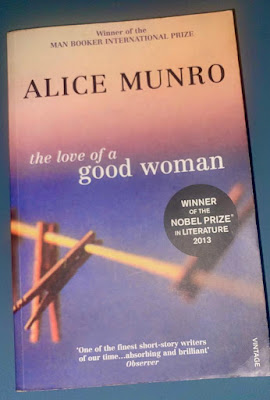Possibly I may have said this before.
Alice Munro was introduced to me by a book worm friend, early into our friendship. Since then she and a handful of others have grown to be my cherished, and possibly only reading circle - given my introvert ways, and we've discovered other authors. But Alice Munro, was definitely introduced to me, not with standing that by that time I had read other prominent authors - Camus, Naipaul, Coetzee to name a few. Anyway, I ventured Munro ground with an audiobook of Runaway, abiding my friend's advice, and was blown away. Ever since, I have made it a habit of reading one short story collection of hers' every year. Last month I read "The Love of a Good Woman", - her ninth, and the tenth overall that I've read to date, and thought, for the umpteenth time, what a remarkable writer she was. I may not summarize each of the short stories as is my usual practice with short story collections. Instead this is going to be an overall summary of her style - the themes she broaches with such an unhurried subtlety, usually in a style in which an idea is born with a mere fragrance of a hint, and then picks form to make up the whole of the story (e.g. The Children Stay - there is something in Pauline as she holidays with her husband, young kids, and her in-laws, to suggest that she is not all present in the beach). Munro, makes the reader even more keen an observer of life, of Life's Love, of sex lives, of memories which keep the aged hanging on.
Let's dwell a moment in each;
Life's Love - In Jakarta, it is clear that both Kent and Sonje still love their respective spouses although both have moved on in life, got into other relationships, and have grown children. Some loves are like that, where even though one partner doesn't feel the intensity of a relationship, the impact to life, if not life itself is defined by this same relationship for the other partner
Sex Lives - what Kath was missing in her relationship with Kent in 'Jakarta'; what Pauline missed with Brian in 'The Children Stay'; possibly her last chance at intimacy for Eve with a girl junkie ('Save the Reaper') when it was clear that Eve was no longer needed in her daughter's life.
Memories that keeps one hanging on - Mr. Willens' has his 'way' with Mrs. Queen - an unmentioned act of force (which could even suggest even a silent consent,) and how Rupert put a 'stop' to it for for good, and how this secret was possibly the most important thing which kept the otherwise terminally Mrs. Queen alive, a little later in her life ('The Love of a Good Woman'). Or Mr. Gorrie, and his secret that he possibly lived over and over again in his mind, in those last paralyzed years of his ('Cortes Island'). It was noted that neither Mrs. Queen nor Mr. Gorrie hinted of any regret given that both acts fall under acts of crime.
Then there are other stories which reflect on somewhat different topics for Munro. Parenthood - good and bad feature prominently in this collection.
As an example of bad parenthood, we find Karin, hungry for her mother's love trying to find her place as a child while her mother fights her own battles, in 'Rich as Stink'. The last scene in which Karin burns herself accidentally, while retaining her scars on her neck till her college days, which symbolize her becoming comfortable with the scars that life has thrown her way, and maturing through them.
"She came out of that, of course, she came back to being a Karin. Everybody thought she was just the same except for her skin. Nobody knew how she had changed and how natural it seemed to her to be separate and polite and adroitly fending for herself. Nobody knew the sober, victorious feeling she had sometimes when she knew how much she was on her own."
Parental love, genuine, but not shown in obvious ways is captured beautifully in 'Before the Change'. Was it his daughter's admission, which caused too much of a shock, given what he has been practicing as a doctor, that killed the father ? Was it the missing bloodied money that made the daughter realize her father's true love for her ?
'My Mother's Dream' is possibly the most unusual short story of Munro I have read to date, as the narrator is a baby girl of some month's age. The baby's initial dislike of its mother, her preference for her aunt, her fight for her life, her decision to 'lose' and 'survive' which she thinks of as an acceptance of her sex, all make for a deeper analysis.
In summary, all I can say is that this is yet another brilliant short story collection. I still have four of her short story collections lined up to read, and then possibly reread her work from start as she requested her readers to do, when she announced her retirement from writing in 2013.
Rating: *****

No comments:
Post a Comment